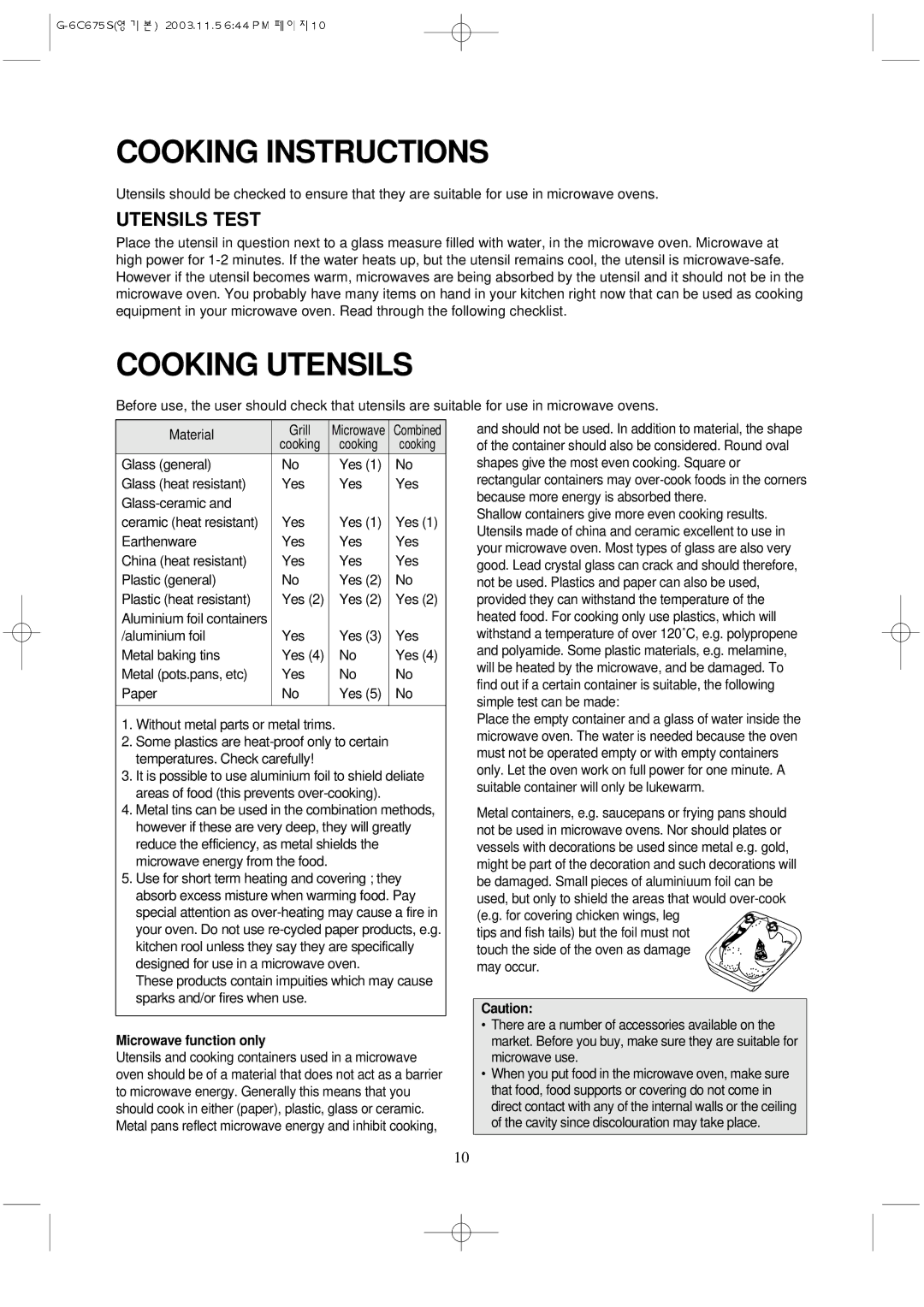
COOKING INSTRUCTIONS
Utensils should be checked to ensure that they are suitable for use in microwave ovens.
UTENSILS TEST
Place the utensil in question next to a glass measure filled with water, in the microwave oven. Microwave at high power for
COOKING UTENSILS
Before use, the user should check that utensils are suitable for use in microwave ovens.
Material | Grill | Microwave | Combined | |
cooking | cooking | cooking | ||
| ||||
Glass (general) | No | Yes (1) | No | |
Glass (heat resistant) | Yes | Yes | Yes | |
|
|
| ||
ceramic (heat resistant) | Yes | Yes (1) | Yes (1) | |
Earthenware | Yes | Yes | Yes | |
China (heat resistant) | Yes | Yes | Yes | |
Plastic (general) | No | Yes (2) | No | |
Plastic (heat resistant) | Yes (2) | Yes (2) | Yes (2) | |
Aluminium foil containers |
|
|
| |
/aluminium foil | Yes | Yes (3) | Yes | |
Metal baking tins | Yes (4) | No | Yes (4) | |
Metal (pots.pans, etc) | Yes | No | No | |
Paper | No | Yes (5) | No | |
|
|
|
|
1.Without metal parts or metal trims.
2.Some plastics are
3.It is possible to use aluminium foil to shield deliate areas of food (this prevents
4.Metal tins can be used in the combination methods, however if these are very deep, they will greatly reduce the efficiency, as metal shields the microwave energy from the food.
5.Use for short term heating and covering ; they absorb excess misture when warming food. Pay special attention as
These products contain impuities which may cause sparks and/or fires when use.
Microwave function only
Utensils and cooking containers used in a microwave oven should be of a material that does not act as a barrier to microwave energy. Generally this means that you should cook in either (paper), plastic, glass or ceramic. Metal pans reflect microwave energy and inhibit cooking,
and should not be used. In addition to material, the shape of the container should also be considered. Round oval shapes give the most even cooking. Square or rectangular containers may
Shallow containers give more even cooking results. Utensils made of china and ceramic excellent to use in your microwave oven. Most types of glass are also very good. Lead crystal glass can crack and should therefore, not be used. Plastics and paper can also be used, provided they can withstand the temperature of the heated food. For cooking only use plastics, which will withstand a temperature of over 120˚C, e.g. polypropene and polyamide. Some plastic materials, e.g. melamine, will be heated by the microwave, and be damaged. To find out if a certain container is suitable, the following simple test can be made:
Place the empty container and a glass of water inside the microwave oven. The water is needed because the oven must not be operated empty or with empty containers only. Let the oven work on full power for one minute. A suitable container will only be lukewarm.
Metal containers, e.g. saucepans or frying pans should not be used in microwave ovens. Nor should plates or vessels with decorations be used since metal e.g. gold, might be part of the decoration and such decorations will be damaged. Small pieces of aluminiuum foil can be used, but only to shield the areas that would ![]()
tips and fish tails) but the foil must not touch the side of the oven as damage may occur.
Caution:
•There are a number of accessories available on the market. Before you buy, make sure they are suitable for microwave use.
•When you put food in the microwave oven, make sure that food, food supports or covering do not come in direct contact with any of the internal walls or the ceiling of the cavity since discolouration may take place.
10
